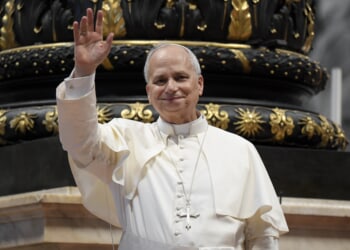I expect most Conservative Home readers follow opinion polling attentively. But even those with a more casual interest will have noted that Reform UK has been consistently ahead since the local elections in May. The conventional wisdom is that this is a passing craze. Like Ugg Boots or CB Radio. Lord Mandelson, the British Ambassador to the United States, articulated this view when he was summoned by JD Vance, the Vice President, to explain Reform UK’s popularity. (Calling the meeting shows a certain sense of humour on Vance’s part.) Mandelson told The Times:
“I explained to the vice-president that, yes, highly effective populists and political actors like Farage can take advantage. At the end of the day, at the election, people will be choosing their future government — not having a fling, expressing a protest, or demonstrating their impatience. And in that sense, I said, perhaps Nigel is peaking too soon.”
Maybe. But what if Labour falls further? The polling has them settled in second place. But it is quite plausible they could fall to third.
Further tax increases are expected in the Budget, threatening to kill off what modest economic growth we still have – especially if the short-term political expedient of “taxing the rich” is chosen. A “doom loop” thus results in the public finances getting even worse. Liam Haligan reckons we could end up with another 1976-style IMF bailout. Then we’ve got the launch of Jeremy Corbyn’s new party in November, likely to take a few points off Labour. In this year’s local elections, Labour didn’t have much to lose. But in next year’s they do. If they experience a drubbing that could prompt insurrection in the ranks.
There is also the gradual erosion of the “give us a chance, we’re a new Government…” excuse.
The Conservatives moving up to second place would provide a psychological boost. The media would pivot to reflecting on Labour support plunging to “extinction level” and questions about its leader being ousted.
But that would still leave Conservatives in a dire position. However badly Labour does, there is still the problem of persuading Conservatives to vote Conservative – rather than abstain or switch to Reform UK. The reason is no mystery. The last Conservative Government pursued socialist policies – state spending, tax and borrowing zooming up to record levels. Immigration got out of control. Woke absurdities were given official protection.
Repudiating that record might help us to be forgiven. We have the uncomfortable paradox that to be unapologetic advocates of Conservatism means being apologetic for the Conservative Government. The hitch is that too emphatic a repudiation would undermine party unity – which Kemi Badenoch has prioritised.
Shadow Ministers, when challenged on the airwaves naturally defend the personal role they played when they were Ministers. Some say the tax and spending increases were regrettable but necessary. Other would even claim that higher spending (or “investment” as Tory MPs used to call it) was justified as a virtue. For instance David Cameron, Theresa May, and Boris Johnson all defended the disastrous HS2 project, seeing it as their “legacy”, regardless of spiralling costs.
Often, the message was put out by senior Conservatives that Margaret Thatcher’s approach was “right for the time” but her principles were out of date. But it is now surely all too apparent that the economic realities she recognised are timeless.
Some Conservative politicians would defend increased state intervention as the means to succeed. Writing on this site John Glen MP defended spending increases in the 2020 Budget as the challenge of “weak productivity cannot be met by stale repetition of small state mantras.” There was the hubris that state intervention and all the meddling of “picking winners” and pet projects was fine if the Conservatives were doing it. The languishing economic performance that resulted tested that to destruction.
If Conservatives are proud of our record is the implication that we will offer more of the same if given the chance?
In fairness, Badenoch has given some clear signs of a new direction. Net zero has been abandoned. The misguided attack on property rights and voluntary contracts in the private rented sector is no longer our mantra. Labour is pursuing the last Conservative Government’s agenda on that – but no longer with Conservative support.
Then we have the ECHR. It is expected that at the Party Conference, it will be announced that the Conservative Party favours withdrawal. We could then say to the British people that we recognise we failed to deport people entering the country illegally. That was because we would not leave the ECHR and we now recognise that was a serious mistake.
Should our mea culpa be more emphatic? It would help. Though time is the main healer.
I don’t think a change in leader would do anything to accelerate the electorate’s forgiveness. A leadership challenge would be a kind of non sequitur. An answer to the wrong question. A displacement activity. It’s not about personalities.
Kemi Badenoch and Robert Jenrick are much the same in the way that matters. One is a black woman and another is a white man. So what? Both are staunch Conservatives. They are Authentic Conservatives, as Badenoch puts it. Look at their bookshelves and you will find the same books. Jenrick used to be less bold than Badenoch but after he was “radicalised” at the Home Office he is now more bold. If Jenrick had become leader he would have been quicker to ditch the ECHR, slower to ditch Net Zero. The same challenges would have applied and he would have imposed similar constraints in the cause of unity – for instance feeling the need for a “balanced” shadow Cabinet, seeking to avoid picking fights with his predecessors.
So within that constraint how can the Conservatives restore credibility? I suggest offering policies in some specific areas which combine the excitement of radicalism with the tedium of detail. General aims are not convincing. Nor is incoherent technocratic mush. We need to demonstrate seriousness of intent to apply proper Conservative principles.
For example:
Setting farmers free. In 2022, thousands of farmers sent a letter to the then Prime Minister Liz Truss declaring they were “sick of the mountains of regulations which seek to micromanage every acre”. Jamie Blackett was among them and he has written powerfully about how much of the red tape is not only burdensome but perverse. He could be asked to coordinate a group that would compile of list of regulations that should be scrapped.
Tax simplification. In 2010, George Osborne complained that, under Labour, the tax code had more than doubled to 11,000 pages. It’s now over 25,000. In Hong Kong it’s 276 pages. Why not task some public spirited retired tax accountants to offer a redrafted UK tax code that would be cut down to under a thousand pages?
Rail competition. Tony Lodge has already done the work with research for the Centre for Policy Studies on how “open access” should be extended. This policy would allow Conservative MPs and candidates to make the case with local examples.
Charlie Dewhirst, MP for Bridlington and The Wolds, showed the way in his maiden speech:
“Where genuine competition exists, rail privatisation has been a success. On the east coast main line, the Government-subsidised franchise, London North Eastern Railway, competes with open access operators Hull Trains, Grand Central and Lumo. That has led to cheaper prices for users, high satisfaction and greater punctuality, and inter-city services have been extended to new towns and cities across Yorkshire and the north-east. One of those operators, Hull Trains, now runs two direct services a day between Beverley and London, and I would love to see them extended to Bridlington and Driffield, just up the line in my constituency.”
Abolition of the Environment Agency. Perhaps one for Matt Ridley? It has a £1.4 billion budget. It should be abolished. But the challenge is to find substantial savings with better environmental outcomes. What functions should be abolished? What ones retained and continued by DEFRA, with Ministers accountable? Which ones should be done differently? One issue to be considered is whether the onerous requirement for a rod licence should be abolished. I suspect David Lammy would be sympathetic.
Would any of this threaten Party unity? Would John Glen have any objections? These are just some examples. A lot more would be needed for a full programme. Welfare reform, home ownership, policing, and quango abolition would each justify several specific proposals. A proper Conservative “Contract for Britain” would be a weighty volume.
A set of detailed policies for civil servants to be instructed to implement if a new Conservative Government is elected would help restore trust. I am all for Conservatives seeking to convert socialists. But the greatest challenge the Conservative Party has is to persuade Conservatives to vote Conservative – by offering the strongest, most thorough, authentically Conservative programme for national renewal.




![Steak ’n Shake Mocks Cracker Barrel Over Identity-Erasing Rebrand [WATCH]](https://www.right2024.com/wp-content/uploads/2025/08/Steak-n-Shake-Mocks-Cracker-Barrel-Over-Identity-Erasing-Rebrand-WATCH-350x250.jpg)




![Mount Rushmore Could Get Trump Upgrade Under GOP Push [WATCH]](https://www.right2024.com/wp-content/uploads/2025/07/Mount-Rushmore-Could-Get-Trump-Upgrade-Under-GOP-Push-WATCH-350x250.jpg)
![Soros Network, Others Behind LA Riots [WATCH]](https://www.right2024.com/wp-content/uploads/2025/06/Soros-Network-Others-Behind-LA-Riots-WATCH-350x250.jpg)





